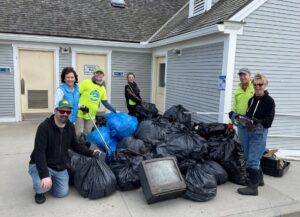 HYANNIS – Quitting smoking, wearing a respirator while working with pollutants, avoiding spray cleaners and exercising regularly may be inconvenient, but those options are a lot easier than living with a chronic, progressive, crippling and possibly fatal respiratory condition.
HYANNIS – Quitting smoking, wearing a respirator while working with pollutants, avoiding spray cleaners and exercising regularly may be inconvenient, but those options are a lot easier than living with a chronic, progressive, crippling and possibly fatal respiratory condition.
It’s easy to take breathing for granted until you have a problem that may be irreversible.
“Around age 25, people’s lung function starts to decrease,” said pulmonologist and intensivist Scott A. Slater, MD, who works at both Pulmonary Internists and Consultants in Hyannis and Cape Cod Hospital’s intensive care unit.
It’s important to take care of your lungs to avoid problems in later life. Dr. Slater recommended these preventive steps:
Don’t smoke.
Avoid exposure to airborne pollutants at work and at home.
Stay active and exercise.
Keep up with vaccinations for respiratory diseases, especially flu and pneumonia.
If you do have a breathing problem, make sure it’s managed well.
“Smoking anything is not a good idea,” Dr. Slater said, adding that this admonition includes marijuana and vaping, which he said are not safe alternatives.
“Your lungs are designed to take in air – that’s it,” he said.
Smoking can lead to lung cancer, chronic bronchitis and emphysema. The latter two conditions are both considered forms of COPD, or chronic obstructive pulmonary disease. All make breathing progressively difficult, and lung cancer and emphysema can be fatal, according to the National Institutes of Health’s (NIH) National Library of Medicine.
The particulates and gases in smoke not only irritate the lungs’ delicate tissues and clog them with dirt and tar, but they can cause an inflammatory response in which the body starts to digest lung tissue, causing holes or pockets, Dr. Slater said.
Toss the Air Freshener
In addition to smoke, regular exposure to other pollutants, such as paint, diesel fumes, solvents, wood shavings, even household cleaners can damage lungs. Dr. Slater estimated that 30 percent of his patients developed lung problems as a result of their work. Another 40 percent developed breathing issues because of smoking, he said.
Workers who are exposed to pollutants through their work or a hobby should wear a respirator mask over their nose and mouth, he said.
Household cleaners and air fresheners can also hurt your lungs, especially if they are sprays, Dr. Slater said. Clean with a liquid, if possible, he said, or “If you spray, don’t walk through it.”
According to the American Lung Association, some cleaners release dangerous fumes, such as bleach and ammonia, which should never be mixed because they react to form chlorine gas. Others contain toxic volatile organic compounds (VOCs) or fragrances that combine with ozone to form formaldehyde. These can cause allergic reactions, irritate lungs and worsen asthma, a chronic condition of inflamed airways that narrow when reacting to inhaled substances.
The American Lung Association suggests most cleaning be done with soapy water and urges that air fresheners, even ones labeled as having natural ingredients, not be used at all.
Exercise and Get Vaccinated
Exercise helps keep your heart and lungs working properly. Respiration requires not only your diaphragm, the sheet of muscle under your lungs that’s crucial to inhalation, but muscles in your chest and throat as well. According to the National Library of Medicine, exercise increases muscle strength and function, including the muscles of the heart, making both breathing and blood circulation more efficient.
“Pick up a habit where you stay active,” Dr. Slater said.
Getting vaccinated against respiratory diseases just makes good sense as preventive healthcare. If you have lung disease, or are over 65, it’s essential to protect yourself from contracting pneumonia, as it could put you in the hospital or kill you, he said.
For people with lung disease, it’s important that their condition be properly medically managed. As an example, some moderately affected asthma patients are incorrectly treated as having a mild condition and are given only an emergency inhaler when they also need a daily inhaler to keep their condition under control, said Dr. Slater.
“They end up in the ER or on prednisone,” he said. “One is inefficient, the other problematic.”
Genetic Flaws
Some people are more prone to the inflammatory response triggered by smoking because they have a genetic flaw that results in an imbalance between two substances in the body – one that promotes lung cell growth and a second that breaks down lung tissue. These two substances normally keep each other in check, but people with this genetic flaw don’t make enough of a protein called alpha-1 antitrypsin. Without that check, an enzyme that helps fight infection attacks lung tissue, according to the NIH.
Affected people begin experiencing shortness of breath and wheezing between the ages of 20 and 50, according to the Genetics Home Reference of the NIH. This condition, called alpha-1 antitrypsin deficiency or AATD, often leads to emphysema.
Replacement therapy with the missing protein can help keep the breakdown of lung tissue under control, but there is no cure, according to the National Human Genome Research Institute of the NIH.
“Some people get end-stage disease in their 40s,” he said. “If people are 40 or 50 (with AATD) and they continue to smoke, they’re going to need a lung transplant.”























